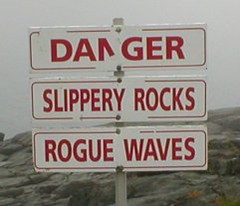I've always approached life to some degree from an academic standpoint. At least, I've always understood (I think it came from being a bookish and curious kid) that when interested in - or confronted with - something new, the best approach was to start by researching it. When we decided to get a cat, I spent hundreds of hours and dollars on devouring everything I could find on the internet, in libraries, buying books and magazines, all about the care and behavior of cats. Research is your friend. It can be a comforting lamp in dark places or a weapon in your back pocket. It always makes you more prepared for what is to come.
I approached going deaf the same way. I wish I knew how many hundreds of hours I've spent on the 'net learing about deafened adults.
The thing about researching this is that it has been so damned depressing. If I had a nickel for every essay I've read entitled "Deafened Adults: Falling Between The Cracks" or some variation of the 'cracks' theme, I'd be able to head to the US and get my CI now. If I had another for every that mentioned the words "falling through/between the cracks" somewhere in the body, I'd get two.
The party line is full of defeatist assumptions. Some include:
- deafened adults will never fit in; they aren't deaf, they aren't hearing; the deaf won't accept them and the hearing won't accomodate them.
- Family and friends won't learn sign so it is a useless pursuit for the deafened adult...
- Because even if you do it will take you so long to become proficient that the largest group who use it - congenital/pediatric deaf - will never really understand you, nor you them.
- Deaf services and programs are designed for the congenitally/pediatric deaf and will often be useless to the deafened adult.
- Continuing your employment will require live interpreters or notetakers which are expensive and which your employer will resent paying for.
- Therefore, expect to change jobs, and expect to change drastically downward.
- You will eventually become isolated from family, friends and social activities. One essay I read, after listing the loss of radio, cinema, theatre, guided tours and lectures, mourned that we are even "effectively excluded from... friendly chats in a restaurant or pub..."
- Your only option - indeed, your only hope to become a member of the human family again - is to get a Cochlear Implant. (If you live in the US and don't have health insurance, this last little underlying message from the experts must be a great comfort.)
- Deaf people will hate you for having the implant; hearing people won't know how to communicate with you to facilitate its use. Small animals and children may be afraid of you.
Oh,
woe is me!
Depressing indeed, but hardly universal. My spouse and several friends are learning to sign. My friend, "Ariel", whose partner is deaf, has a wide circle of deaf friends and I have met a number of them who seem nice, helpful and patient with my signing. They're tickled pink that I am learning - it is one more person they can 'talk' to.
I certainly don't suffer from a lack of friendly chats at the restaurant or pub, even if it is via notebook and pen.
I don't understand. Is my situation
so unique? Are most deafened people out there really surrounded by cold and selfish people, the deaf who don't want them, the hearing who won't help them - even their own family and friends?
Or are many of these self-defeating prophecies written by "experts in the field" rather than deafened people? And are deafened adults repeating the patterns they have been told they will repeat, even if those patterns are from decades ago when services, programs and understanding were so different than they are now?
Oh, I'm not pretending it's easy. It has been much, much harder than I had anticipated, and I've been feeling that especially keenly lately. I am a person who is used to having my success or my failure pretty squarely in my own hands. I goof off, I screw up, it's my fault. I apply myself, I do the job, I am used to succeeding. I'm not keen on having a factor which I can't control gum up the machinery.
I am glad I am a person who does a lot of research when faced with a new challenge. I am also glad that I am an one who is pretty good at sifting "what must be expected and taken into account" from "self-defeating prophecy". Some control over my life may have been taken from me, but it is ceded grudgingly, and I am hanging on to every bit that's left.
ronnie



